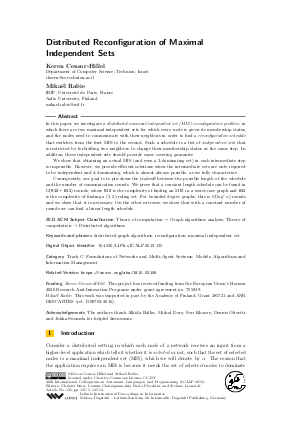LIPIcs.ICALP.2019.135.pdf
- Filesize: 497 kB
- 14 pages

 Creative Commons Attribution 3.0 Unported license
Creative Commons Attribution 3.0 Unported license

In this paper, we investigate a distributed maximal independent set (MIS) reconfiguration problem, in which there are two maximal independent sets for which every node is given its membership status, and the nodes need to communicate with their neighbors in order to find a reconfiguration schedule that switches from the first MIS to the second. Such a schedule is a list of independent sets that is restricted by forbidding two neighbors to change their membership status at the same step. In addition, these independent sets should provide some covering guarantee. We show that obtaining an actual MIS (and even a 3-dominating set) in each intermediate step is impossible. However, we provide efficient solutions when the intermediate sets are only required to be independent and 4-dominating, which is almost always possible, as we fully characterize. Consequently, our goal is to pin down the tradeoff between the possible length of the schedule and the number of communication rounds. We prove that a constant length schedule can be found in O(MIS+R32) rounds, where MIS is the complexity of finding an MIS in a worst-case graph and R32 is the complexity of finding a (3,2)-ruling set. For bounded degree graphs, this is O(log^*n) rounds and we show that it is necessary. On the other extreme, we show that with a constant number of rounds we can find a linear length schedule.





Feedback for Dagstuhl Publishing